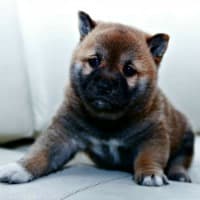Puppy's Fifth Month (weeks 16 - 21)
During your puppy's fifth month he no longer looks, or acts, like a baby.
He's still got a ways to go before he hits that teenage stage but developmentally he's about on par with your average human pre-teen.
His independence and boldness is growing by leaps and bounds and he just can't wait to explore the world around him...
... and he's not going to be too patient about waiting for you to come with him.
Although he's still keen to learn and will pick up new things quickly, he might show some stubborness or even (horror!) ignore you now and then!
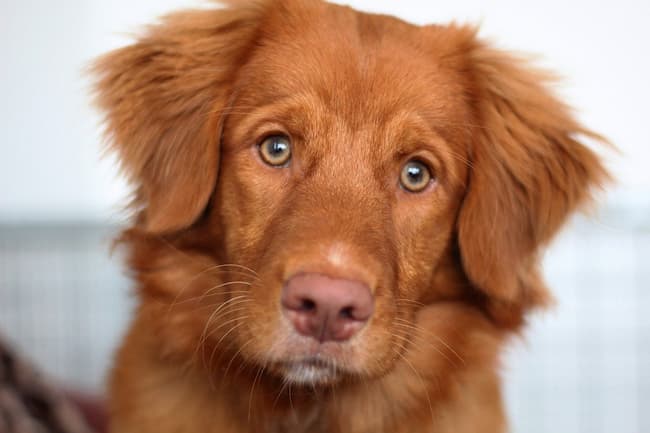
Your little Rascal wants to show you he's a big boy and capable of doing his own thing.
The problem is that he's NOT a big boy... just yet anyway!
Puppy's Fifth Month: Growth & Development
Weeks 16 thru 21 include:
- The Juvenile Period
- Flight Instinct Period (this lasts until around 37 weeks)
He's also just left the critical Imprinting Period behind him
What does this mean to you?
- He's moving away from childhood and towards adolescence (that's the Juvenile part).
- He no longer feels the need to stick close to you or to hang on your every word (that's the Flight part).
Although Rascal is still a l-o-n-g way from being an adult, he's starting to look more like one.
Many of his milk teeth will have been replaced by the larger, permanent teeth.
Large and giant breeds are still in the period of most rapid growth (that will slow down at the end of this month), but medium breeds slowed down in that area last month.
Small and tiny breeds at the end of the third month.
During your puppy's fifth month he may 'blow coat' as his baby fur falls out (in fistfuls) and his adult coat comes in.
This is a period when you could find yourself vacuuming the entire house every day and yet still find dog hair in your coffee!
Puppy's Fifth Month: Health & Safety
By your puppy's fifth month he's so much bigger and stronger than he was less than half a year ago.
Key health-related points for this month:
- A nutritious diet continues to be very important (and will do so throughout his lifetime).
- Exercise requirements may increase around this point, and they need to be met.
- Teething continues.
At this point in his development your puppy will have lots of energy, and a body which needs to work off that energy - both physically and emotionally.
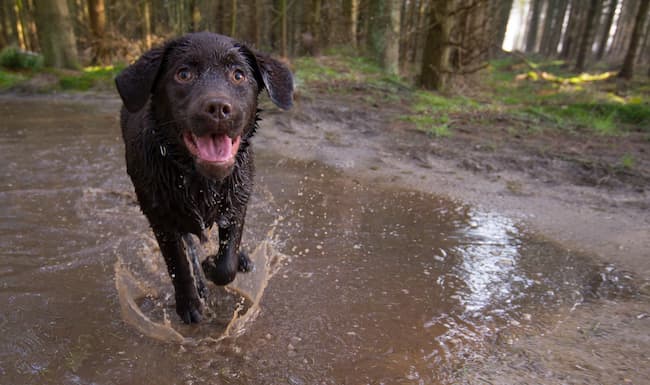
Plenty of exercise help keep your little Rascal happy and can go a long way towards preventing anxiety-related behavior from taking root.
Separation anxiety, destructive behavior, spinning, OCD licking, nuisance barking and so on are all things that your pup might turn to if he has too much energy and no way to work it off.
Of course there are also other reasons for these types of behaviors, but there's a lot of truth to that old saying 'a tired puppy is a good puppy'.
Check his gums regularly to make sure that his milk teeth are falling out when the adult (permanent) teeth come in.
If you notice that he has two rows of teeth in places, or there are baby teeth still wedged in beside his new, bigger, teeth (which were meant to replace them) then discuss the situation with your vet.
Puppy's Fifth Month: What He Needs
During your puppy's fifth month his most important needs include:
- Structured activities, lessons and exercise sessions
- A predictable daily routine and consistency
- Plenty of exercise
- Continuing socialization and training
- For you to be patient with him!
Rascal is a bundle of energy, with very little focus and a fairly short attention span.
He wants to learn, but he wants to do most things his way and doesn't feel the need to have your approval all the time, or to stick close to you.
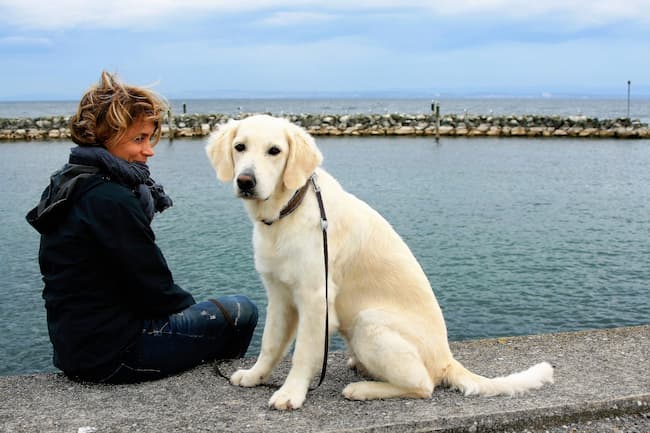
Consistency and predictability help your not-so-little guy to feel secure and safe, which allows him to test his limits, and your patience. This is all normal development and shows that you're raising him properly.
BUT you will need to be patient, understanding, loving yet firm with him. Remember, YOU are in charge.
His need for exercise and physical activity grows in tandem with his legs and muscles.
You can walk him further, play games for longer... and now is a good time to spend more time working on obedience, or join a sport such as agility or flyball.
Of course it goes without saying (or should do by now!) that you need to keep up the socialization that you've both been working on for months.
Socializing a puppy isn't a 'done-and-dusted' affair.
It's something that needs to be a continual activity/habit otherwise your pup might forget that the world outside his door is a happy, comfortable place where he can feel safe and make friends.
Your Rascal is probably pretty reliable in his basic obedience by now.
But now he's getting into adolescence he will 'forget' a command (or even ignore it) from time to time.
This is pretty standard for a pre-teen but you've got to make sure that your pup knows who's in charge, and insist (gently but firmly) that he obeys you whether he wants to or not.
Puppy's Fifth Month: Owner Responsibilities
During your puppy's fifth month your responsibilities are, as always, to meet HIS needs.
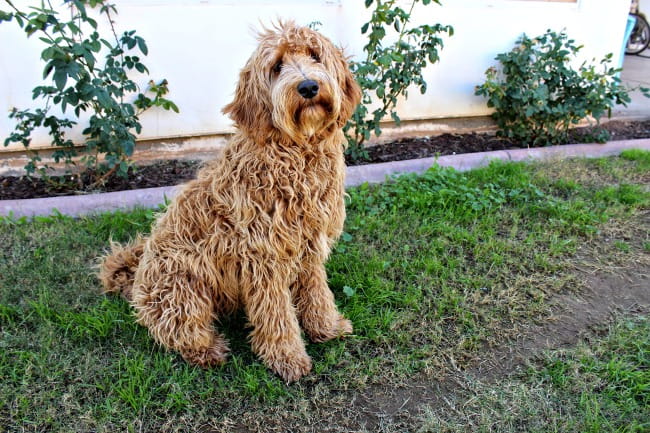
During your puppy's fifth month he's getting more confident and independent with every passing day, and he wants to test his wings... and your patience.
As the proud owner of a pre-teen you need to pass your test with flying colors!
He's straddling the fence between being a child and being a teenager.
Some days the child will be in charge, other days it will be the teen.
Sometimes he'll be both at once... barking at a stranger he believes is a threat to you, while hiding behind your legs! It's an interesting stage and will keep you on your toes :)
The most important owner responsibilities for a five month old puppy include:
- Making sure that your puppy gets plenty of physical exercise
- Making sure that he also gets enough mental stimulation and emotional support
- Providing a consistent daily routine and firm but fair house rules
- Being patient and understanding of early rebellion and mood swings
On the outside your pup doesn't look much like a baby anymore, but on the inside he's still very immature and he needs firm guidelines for his behavior to give him a sense of security.
Walks, games, training sessions (at home and in a formal setting) and lots of out-and-about experiences should be built into every week.
Although he comes across as a brash, confident pup you might be surprised at how fragile his 'ego' and confidence are at this age. When you're training, help him to continue to build self-confidence by keeping lessons and activities upbeat and fun.
You Might Also Like:
- Home
- Puppy Development 101
- Puppys Fifth Month
